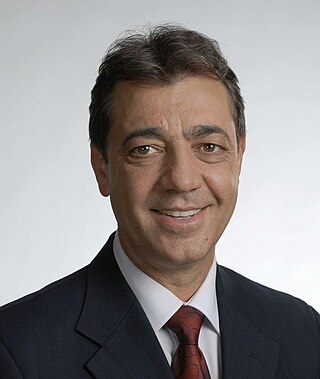
The politics of Bulgaria take place in a framework of a parliamentary representative democratic republic, whereby the prime minister is the head of government, and of a multi-party system. Executive power is exercised by the government. Legislative power is vested in both the government and the National Assembly. The Judiciary is independent of the executive and the legislature.

The Bulgarian Socialist Party, also known as The Centenarian, is a centre-left, social democratic political party in Bulgaria. The BSP is a member of the Socialist International, Party of European Socialists, and Progressive Alliance. Although founded in 1990 in its modern form, it traces its political heritage back to the founding of the BRSDP in 1891. It is also Bulgaria's largest party by membership numbers.

Trade unions in India are registered and file annual returns under the Trade Union Act (1926). Statistics on trade unions are collected annually by the Labour Bureau of the Ministry of Labour, Government of India. As per the latest data, released for 2012, there were 16,154 trade unions which had a combined membership of 9.18 million. The trade union movement in India is largely divided along political lines and follows a pre-Independence pattern of overlapping interactions between political parties and unions. The net result of this type of system is debated as it has both advantages and disadvantages. According to the data submitted by various trade unions to the Ministry of Labour and Employment as part of a survey, INTUC with a combined membership of 33.3 million, has emerged as the largest trade union in India as of 2013.

The Union of Democratic Forces is a political party in Bulgaria, founded in 1989 as a union of several political organizations in opposition to the communist government. The Union was transformed into a single unified party with the same name. The SDS is a member of the European People's Party (EPP). In the 1990s the party had the largest membership in the country, with one million members, but has since splintered into a number of small parties totaling no more than 40,000 members. The SDS proper had 12,000 members in 2016.
The General Labour Federation of Belgium is a socialist national trade union federation in Belgium. It was founded in 1945. It is affiliated with the International Trade Union Confederation and has a membership of 1.5 million. With said membership the ABVV/FGTB is the second largest of the three major trade unions in Belgium, closely following the Confederation of Christian Trade Unions (ACV/CSC) which has 1.6 million members and dwarfing the General Confederation of Liberal Trade Unions of Belgium (ACLVB/CGSLB) which has approximately 300,000 members. During the bulk of its history the ABVV/FGTB remained closely affiliated with the Belgian Socialist Party which was split in 1978 into a Flemish and a Walloon social-democratic party. While remaining formally independent from any political party, the ABVV/FGTB noticed the increasing influence by the marxist Workers' Party of Belgium amongst its active base during the last decade.

The Confederation of Independent Trade Unions of Bulgaria is a trade union confederation in Bulgaria. The CITUB is Bulgaria's largest, most influential and well-established trade union, having several times more members than its largest rival - KT Podkrepa.

The Italian Labour Union is a national trade union centre in Italy. It was founded in 1950 as a socialist, social democratic, republican, and laic split from the Italian General Confederation of Labour (CGIL). It represents almost 2.2 million workers.

General Confederation of Labour was an Italian labor union, founded in 1906, under the initiative of socialist militants. Having survived the Fascist dictatorship and the Second World War as an underground organization, the CGL joined the cross-party CGIL labor federation in 1945.
The Bulgarian Social Democratic Workers Party (Broad Socialists) (Bulgarian: Българска работническа социалдемократическа партия (широки социалисти), Balgarska rabotnicheska sotsialdemokraticheska partiya (shiroki sotsialisti)) was a reformist socialist political party in Bulgaria. The party emerged from a division at the Tenth Party Congress of the Bulgarian Social Democratic Workers Party held in 1903 (the other faction forming the Bulgarian Social Democratic Workers' Party (Narrow Socialists)). The 'Broad Socialist' faction had appeared inside the pre-split party around 1900, when Yanko Sakazov had started the magazine Obshto delo ('Common Action'). The Broad Socialists, analogous to the Mensheviks in the Russian Social Democratic Labour Party, argued in favour a broad social base of the party and broad class alliances.

The Bulgarian Left is a democratic socialist political party in Bulgaria. It was created in February 2009 predominantly by members of the Bulgarian Socialist Party (BSP), with its constituent congress taking place on 4 April 2009. Its leaders are Hristofor Dochev, Ivan Genov, and Margarita Mileva.
Konstantin Trenchev is a Bulgarian medic and syndicalist who is the president of the Confederation of Labour Podkrepa.

The 2024 European Parliament election in Bulgaria was held on 9 June 2024 as part of the 2024 European Parliament election. This was the country’s fifth parliamentary election since its accession to the EU in 2007, and the first to take place after Brexit. Bulgaria also held a separate national parliamentary election that day.
The Autonomous Workers' Confederation is an independent autonomist and syndicalist trade union in Bulgaria. It is chaired by Mergul Hassan, a former female employee of the Piccadilly supermarket chain.

Republicans for Bulgaria is a Bulgarian political party formed as a split from GERB by Tsvetan Tsvetanov, formerly the second most senior official in the ruling GERB party, after he was demoted from his positions by GERB leader and Bulgarian Prime Minister Boyko Borisov. The party's abbreviation (RB) is an allusion to the defunct rightist Reformist Bloc coalition.
The Left! is a Bulgarian centre-left to left-wing political coalition established on 12 February 2023. The members of the coalition are Alternative for Bulgarian Revival, Movement 21, Agrarian Union "Aleksandar Stamboliyski", Bulgarian Progressive Line, Georgi Kadiev's Normal State and BSP splinter faction led by Valeri Zhablyanov. Stand Up.BG, led by Maya Manolova, was part of the coalition until April 2024.
The 2023 Sofia mayoral election was held on 29 October 2023, during the 2023 Bulgarian local elections, to elect the next mayor of Sofia.

Vanya Rumenova Grigorova is a Bulgarian economist, trade unionist, labour activist, and politician. She was an economic counselor to the Confederation of Labour Podkrepa from 2015 to 2023. She unsuccessfully ran for Mayor of Sofia in 2023 and is currently a member of the Sofia City Council.

Professor Vili Mladenov Lilkov is a Bulgarian physicist, politician and author. He is a long term Member of the Sofia City Council and unsuccessfully ran for Mayor of Sofia twice in 2015 and 2023.

Solidary Bulgaria is a left-wing Bulgarian electoral coalition. The alliance was formed prior to the 2024 election. Its chairperson is Vanya Grigorova.













